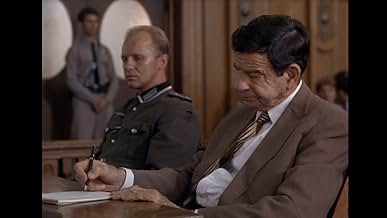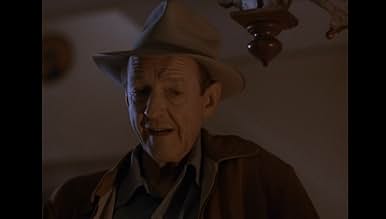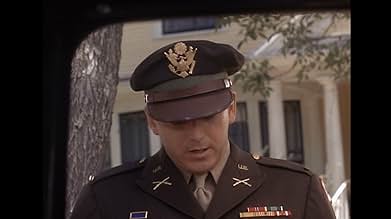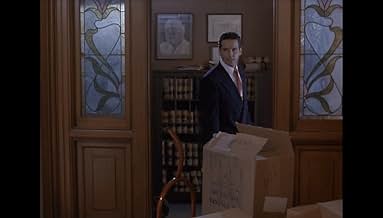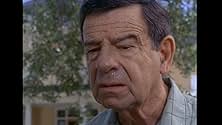Aggiungi una trama nella tua linguaSmall town lawyer Harmon Cobb defends a German prisoner of war against murder charges. Set during World War II, Cobb has to contend with the difficulties of defending the devil when the town... Leggi tuttoSmall town lawyer Harmon Cobb defends a German prisoner of war against murder charges. Set during World War II, Cobb has to contend with the difficulties of defending the devil when the town's only doctor (Barnard Hughes) dies while at Camp Bremen in the fictitious town of Bremen... Leggi tuttoSmall town lawyer Harmon Cobb defends a German prisoner of war against murder charges. Set during World War II, Cobb has to contend with the difficulties of defending the devil when the town's only doctor (Barnard Hughes) dies while at Camp Bremen in the fictitious town of Bremen, Colorado.
- Regia
- Sceneggiatura
- Star
- Vincitore di 2 Primetime Emmy
- 4 vittorie e 2 candidature totali
- Major Lilly
- (as Joe Horvath)
- Sergeant Osias
- (as Robert Mckenzie)
Recensioni in evidenza
This first movie has an impressive cast of familiar faces. In addition to Matthau and Morgan, Barnard Hughes, Robert Carradine, and William Schallert are on hand to provide support.
This film is set in Colorado* during WWII and soon after the story begins, a doctor (Barnard Hughes) is beaten to death at a nearby Prisoner of War camp. A German prisoner is soon charged with his murder and Herman Cobb (Walter Matthau) is shocked when he is chosen to represent the German. After all, Cobb's own son is in Europe fighting the Nazis and Cobb has no interest in the case. But the presiding judge (Harry Morgan) is insistent...and even threatens Cobb to get him to take the case.
Soon after taking the case, it becomes obvious that the prisoner's conviction is pretty much a foregone conclusion and perhaps that is why such a small-time lawyer was 'persuaded' to take the case! But there's far, far more to the story than this...and, believe it or not, it's based on real cases which occurred during the war...cases in which German prisoners were murdering other German prisoners!
The acting in this film is simply supurb....which is what I'd expect with such a cast. Additionally, the writing and production itself clearly are stellar as well. In fact, it's so good that it's surprising it was made for TV...but not at all surprising that the film led to the sequels.
*Oddly, the film is set in the Colorado area but the sequel is in Anne Arundel County, Maryland. Apparently, the Judge moved from Colorado to Maryland...though this was never explained.
A few weeks ago I watched the tvm Incident in a Small Town and I must admit that I was entirely unimpressed by it in fact I thought it was poor. I found out after watching this film that it was one of a series of films involving the character of small town lawyer Harmon Cobb and I was surprised that, if this was the quality of the series, that more than one had been made. So when I saw this film in the schedules I decided to give it a try and see what justified a couple of films. Here we actually have a reasonably good story that deals with interesting conflicting emotions in the characters while a pretty good courtroom drama is delivered without too much fuss. Of course being a TVM it isn't that good but it does do the job. I would have liked the film to get to grips with the feelings of the characters a bit better, rather than just showing the town turn against Cobb in the obvious way they did or having to use a clumsy plot device to show how dedicated he is to truth and justice for all.
However it did do enough to make it interesting and provide more than the rather obvious main narrative to hold the film together. Matthau seems happier here than he did in the sequel I saw there he just seemed bored with the character and the story. Here he has something to work with and, although it is essentially the same sort of character he usually plays, he is still interesting. The support are reasonably good without ever threatening him. Firth is solid as Geiger, Morgan is familiar as the judge and the rest fill in around the edges without anyone really giving a bad performance.
Overall this is an OK tvm that has an OK courtroom drama at its core while also doing enough with other ideas to be interesting. It isn't great but it is quite good if you are watching daytime TV in an undemanding mood. Matthau dominates it and makes it better than it probably deserved to be but generally it does all hang together well enough to be worth a look.
The Incident is a really well-made movie. Director Joseph Sargent, still at it in his late 70s or early 80s, created memorable TV and theatrical films such as "The Marcus Nelson Murders" (to become Kojak), "The Taking of Pelham One Two Three", "Miss Evers' Boys", and "A Lesson Before Dying."
Cobb has to deal with the antipathy of the townsfolk, who are convinced of Geiger's guilt, as well as his own anti-German feelings (as a World War I vet, and especially after he receives news that his son was killed in Europe.) But he ultimately settles into the role he's been given, and gradually uncovers an unsavoury cover-up taking place at the POW camp with the full knowledge of its commander (Joe Horvath.)
This is a surprisingly good story that does keep the viewer guessing most of the way through. Ultimately, I found it to be a little too far fetched to really be believable (which knocked it down a couple of notches in my estimation) but it was still a pretty good who-dun-it sort of mystery.
7/10
Mathau as always turns in wonderful performance as the small town lawyer his style contrasting brilliantly with Firth's powerful but minimalist acting. Story raises many issues that are especially powerful in today's highly partisan political climate when we strangers living in our midst.
Watch this movie you will not be disappointed.
Lo sapevi?
- QuizBarnard Hughes and Helen Stenborg, who portray Dr. and Mrs. Hansen, were married for 56 years (1950-2006).
- BlooperWhen the Lieutenant tells Walter Matthau that his son was killed, the Lieutenant is wearing an Army Commendation Medal on his uniform. The ARCOM or Army Commendation Medal was established by the War Department on December 18, 1945, well after WWII was over.
- Citazioni
Harmon Cobb: What am I gonna do?
- ConnessioniFeatured in The 42nd Annual Primetime Emmy Awards (1990)
I più visti
Dettagli
Contribuisci a questa pagina


